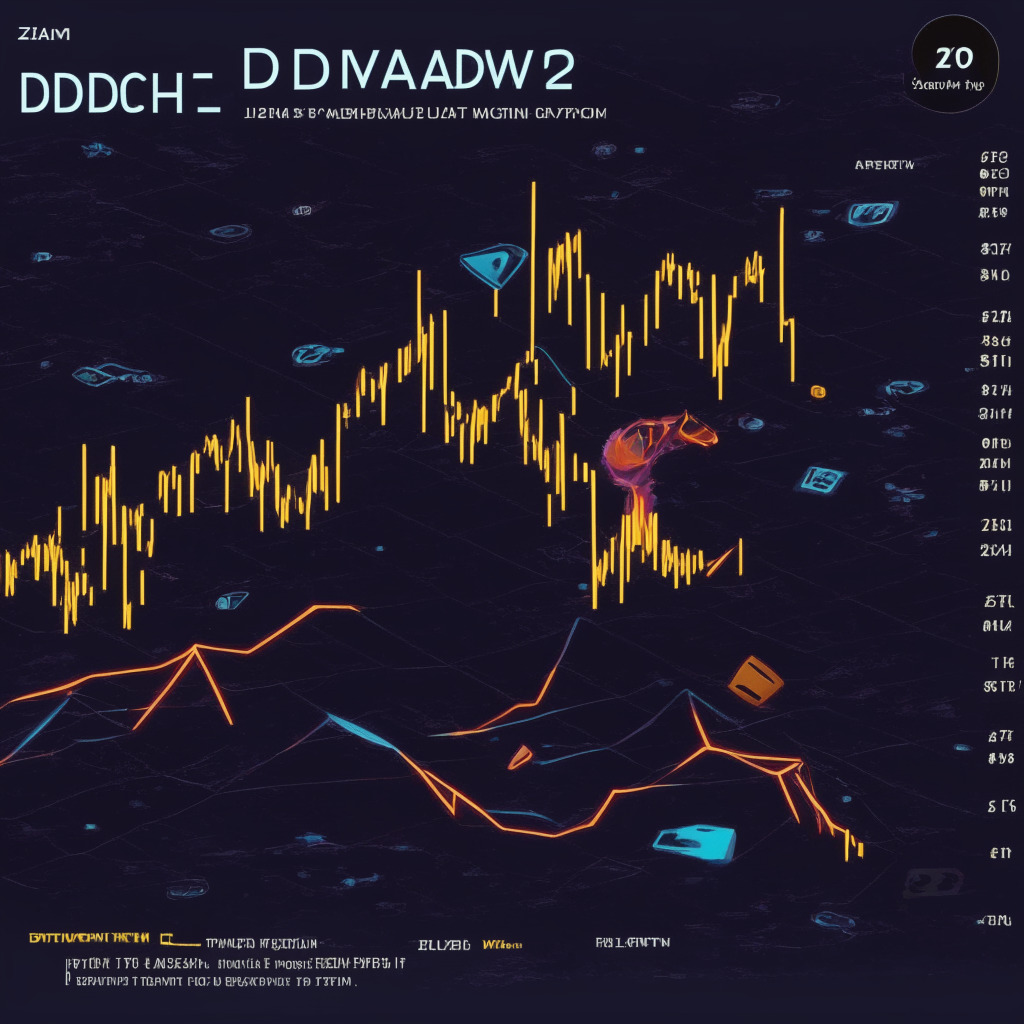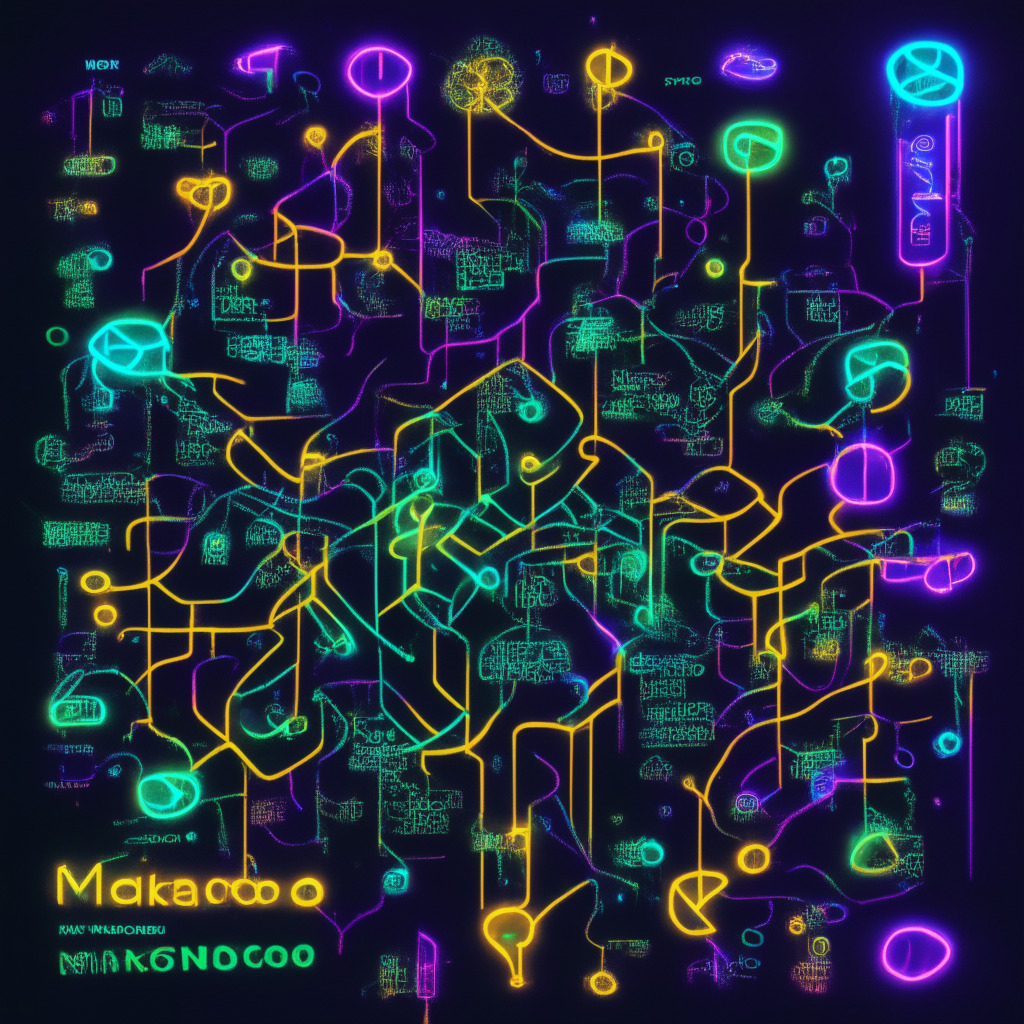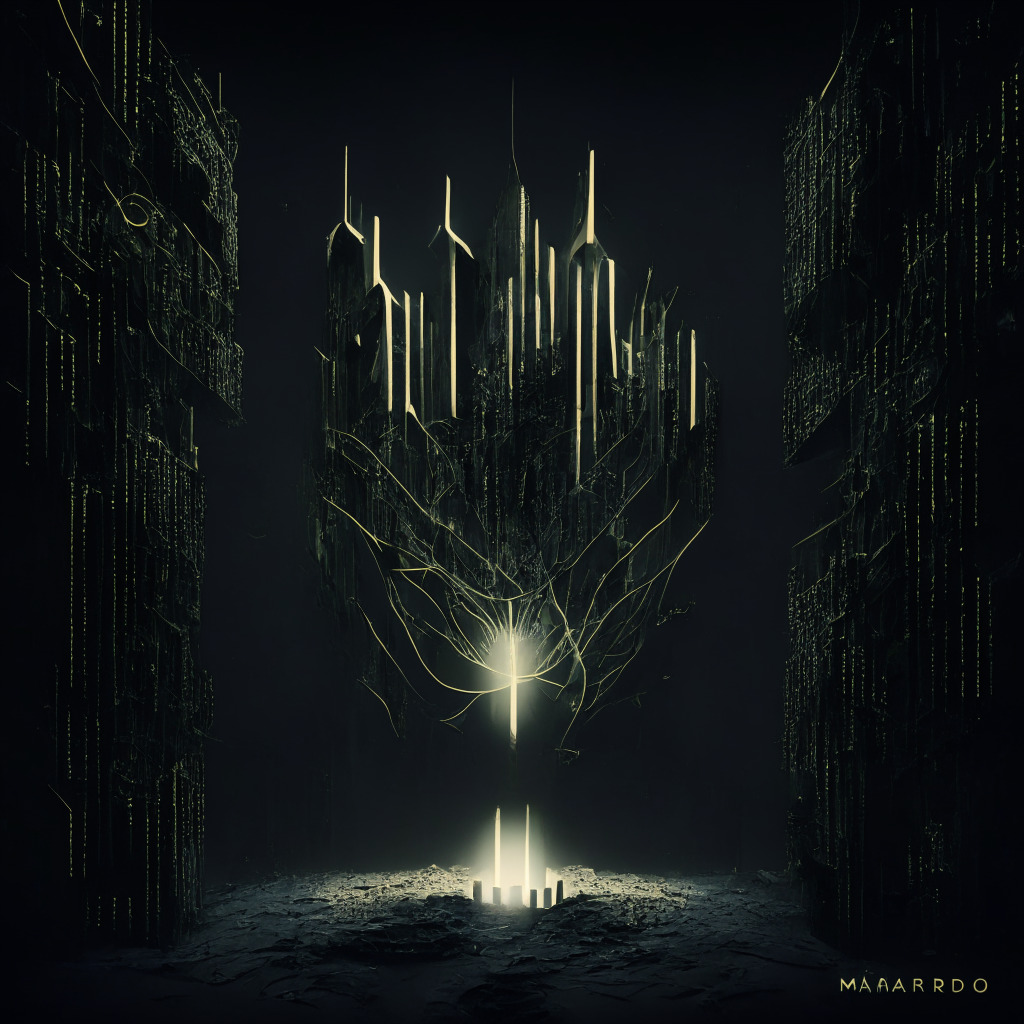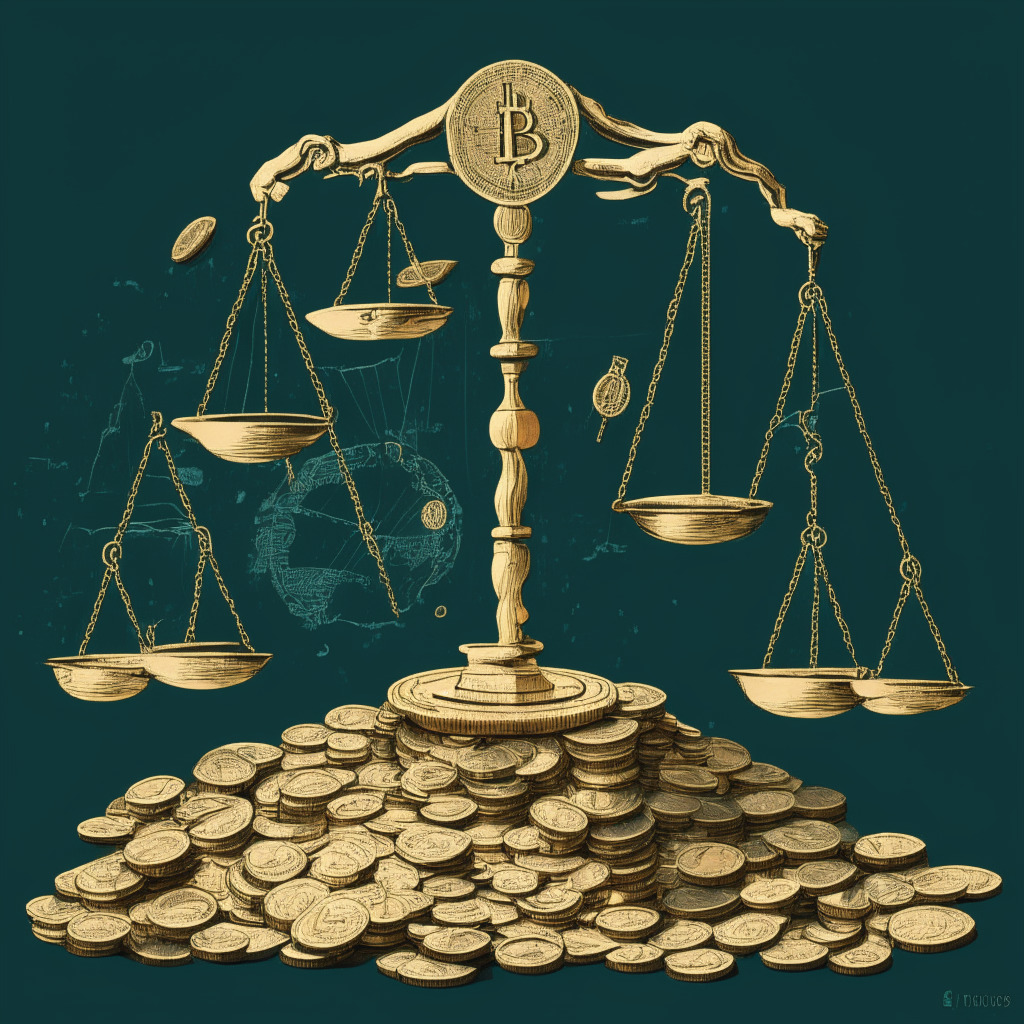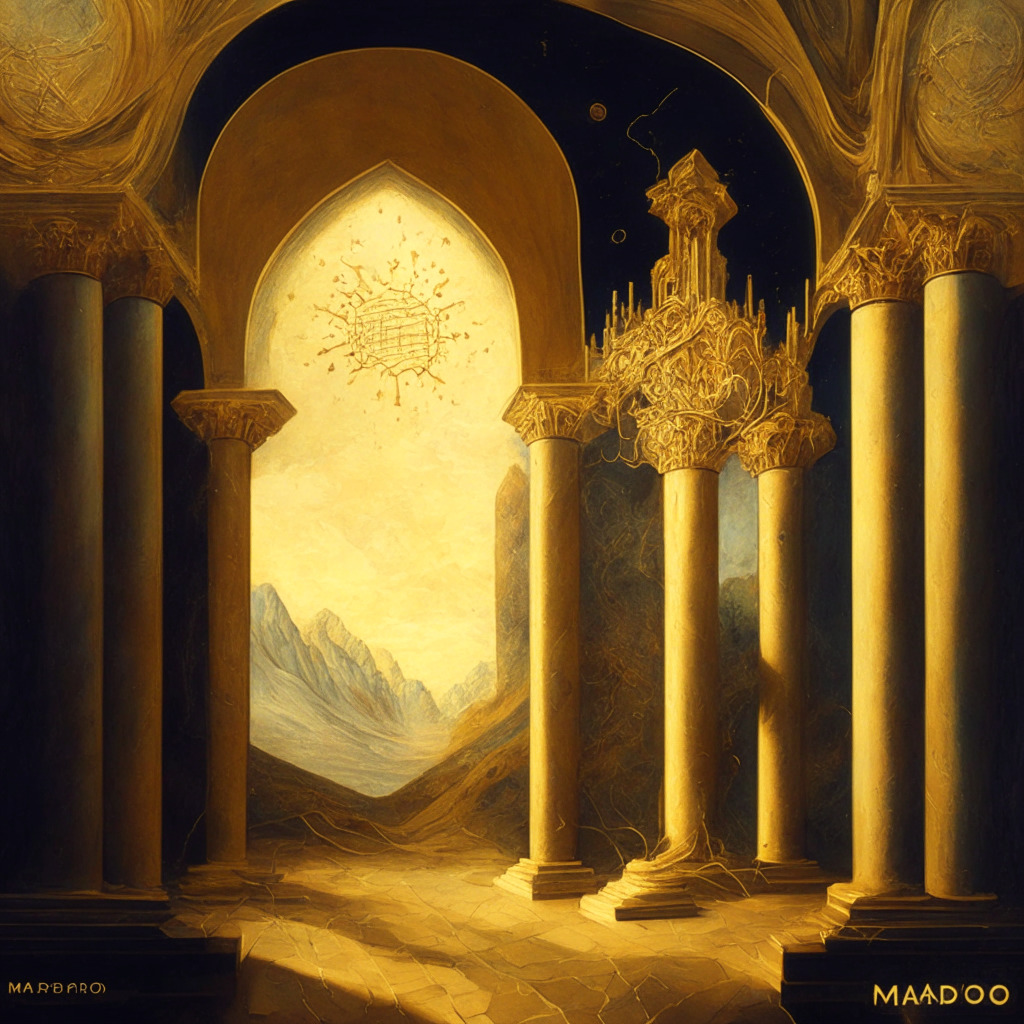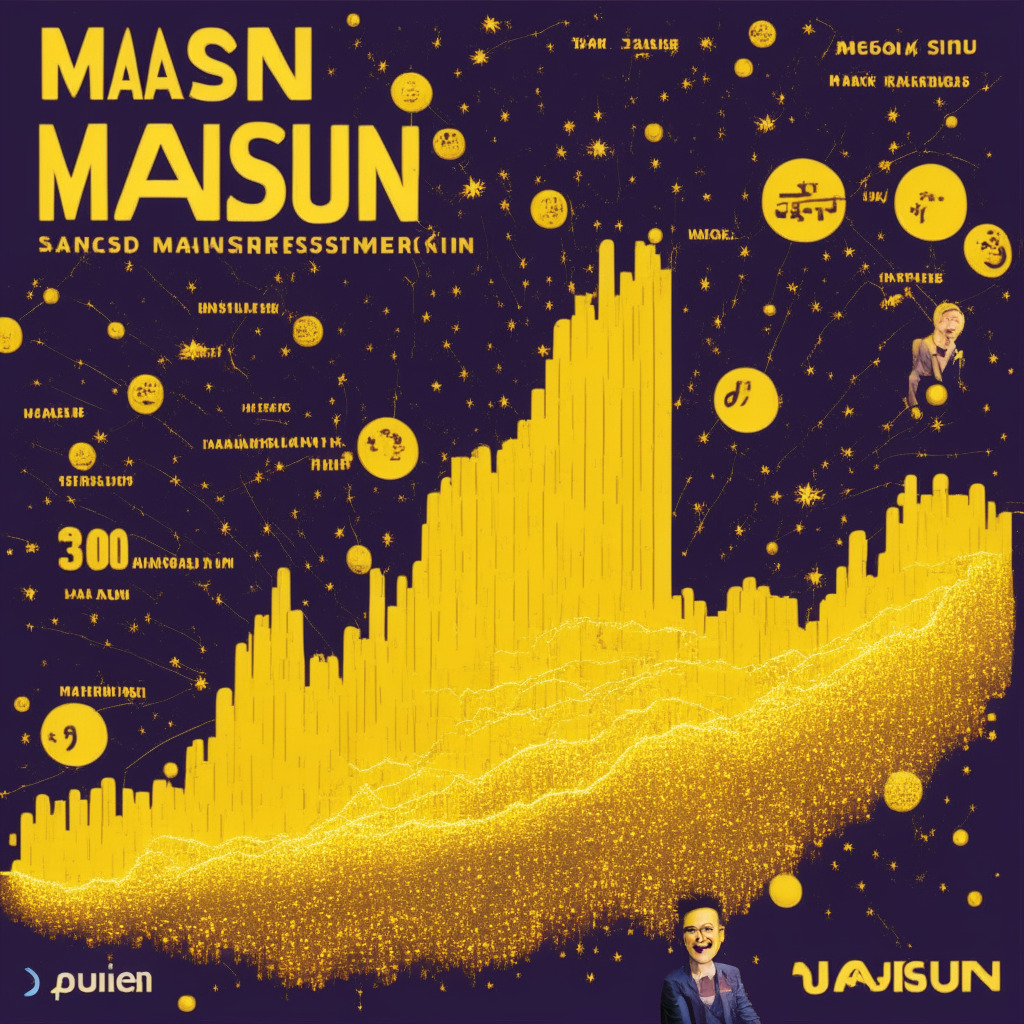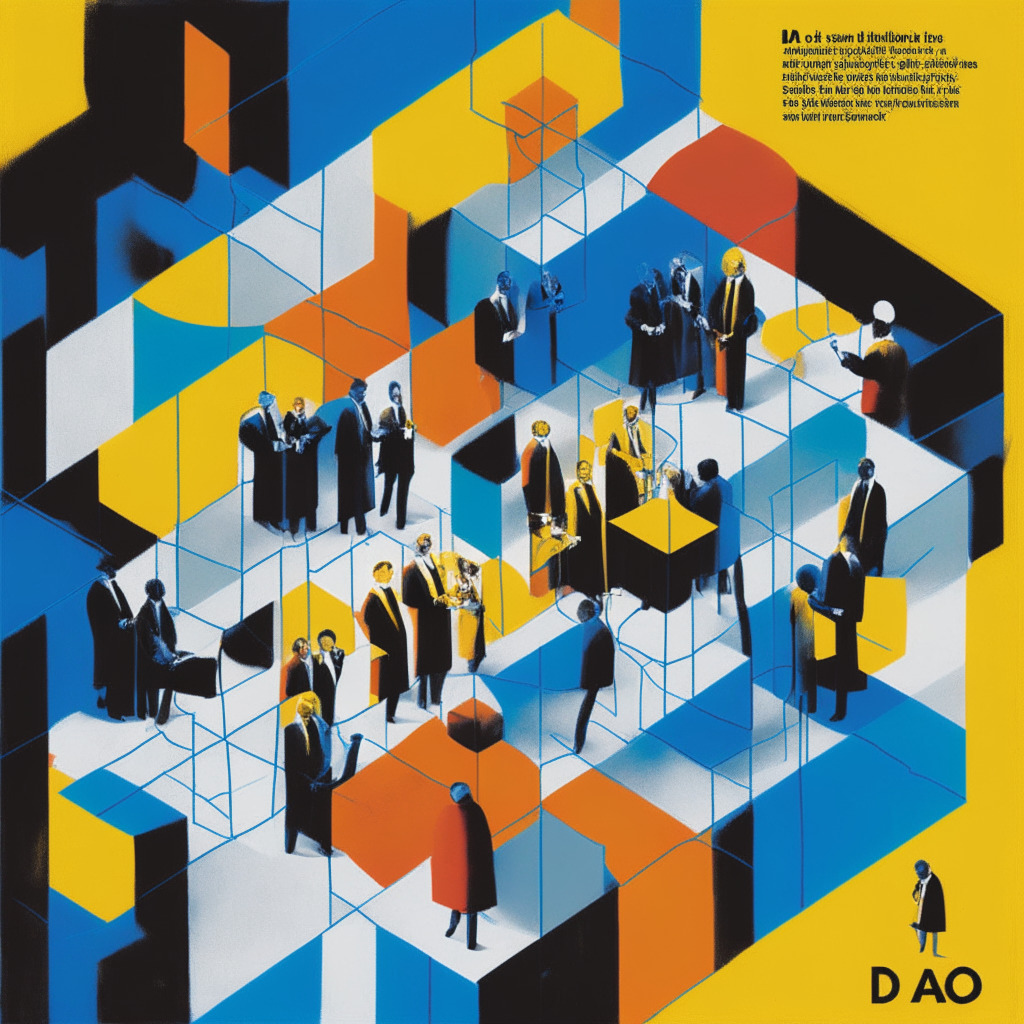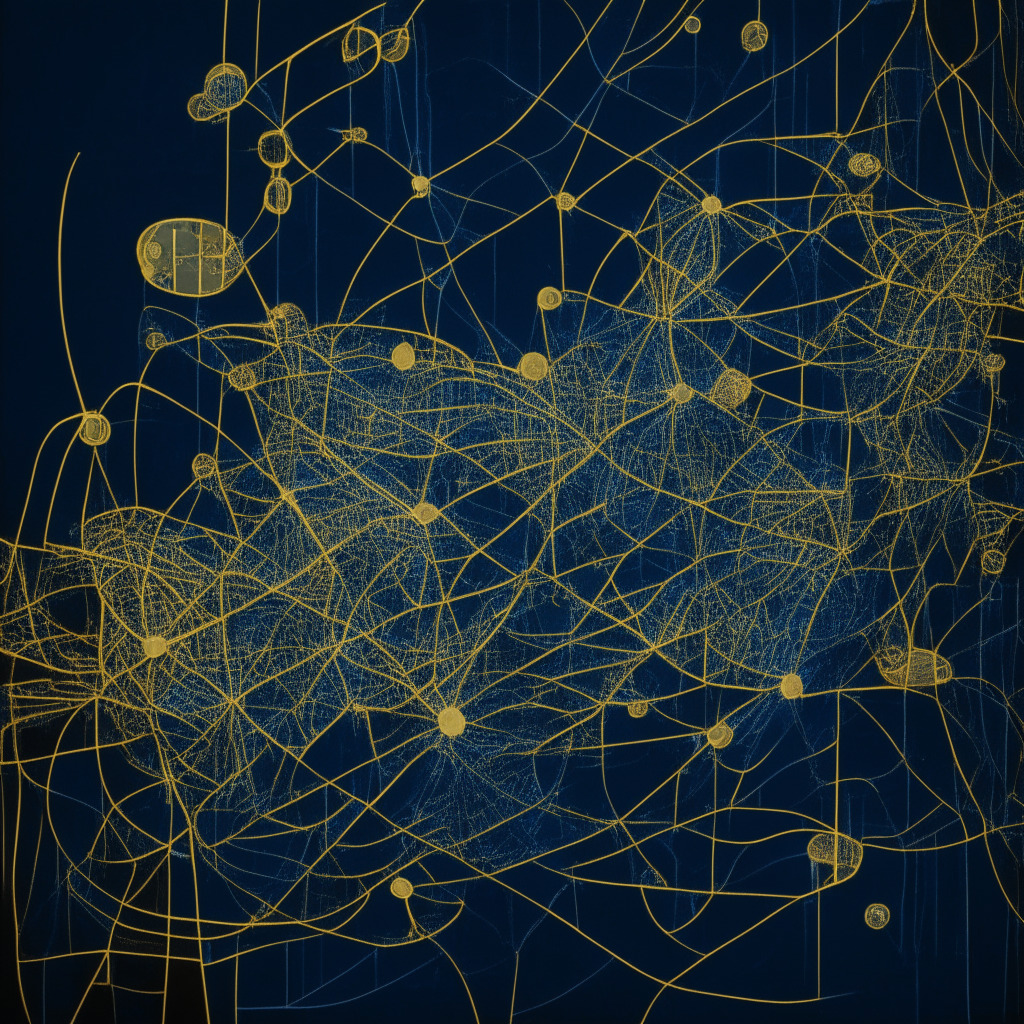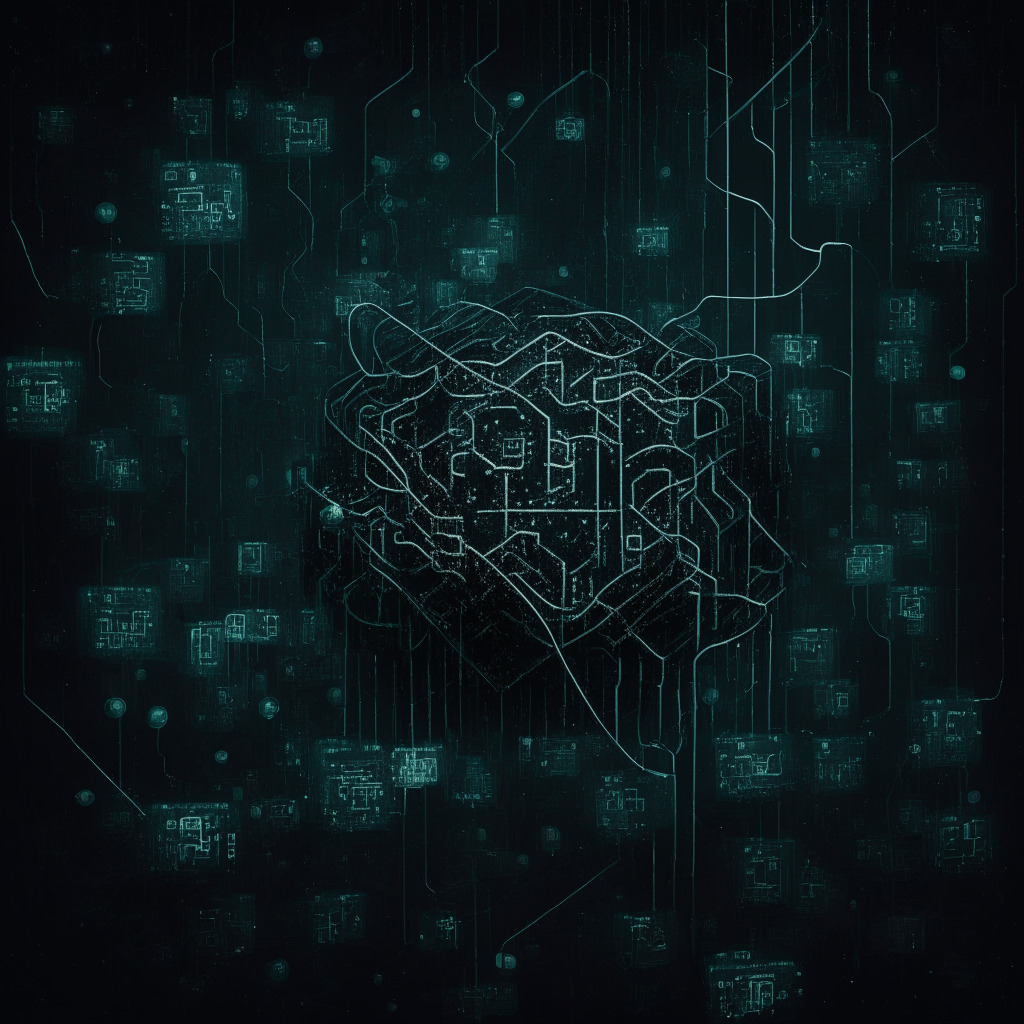The DAO Maker price experiences a downward trend since falling below its 100-day moving average. The RSI indicates oversold conditions, suggesting a potential reversal. Meanwhile, Launchpad XYZ’s ongoing pre-sale of $LPX tokens and its web3 platform development offer attractive investment prospects for early adopters.
Search Results for: DAO Maker
Shifting Alliances in Crypto Winter: MakerDAO’s Migration and Ethereum’s Controversy
“In the midst of a crypto winter, the blockchain industry is innovating and adapting. Major shifts like MakerDAO’s potential move from Ethereum to Solana or Cosmos depict this change. Discussions suggesting Ethereum should have a “Supreme Court” for disputes also indicate this evolution. Amid technological advances, the volatile crypto world is reminded: “Money doesn’t materialize out of thin air.””
Ethereum’s Co-founder Sells Remaining Stake in MakerDAO: A Signal for Blockchain’s Future?
Ethereum co-founder, Vitalik Buterin, recently traded his remaining stake in MakerDAO tokens after MakerDAO’s co-founder announced plans to reimplement the project on a new blockchain, NewChain. The move shows shifting alliances and notable developments in blockchain dynamics.
MakerDAO’s Blockchain Future: Exploring a Forked Solana Codebase and Risks Involved
MakerDAO’s co-founder, Rune Christensen, proposes the use of a forked Solana codebase to build ‘NewChain’, MakerDAO’s prospective blockchain. Despite connections with Ethereum, this has generated interest and skepticism within the decentralized finance domain. This marks a possible change in direction for MakerDAO’s projects.
Decoding the Future of MakerDAO: Might Solana be the Answer?
Rune Christensen, co-founder of MakerDAO, proposes the platform’s future blockchain should be built using Solana’s codebase, citing its high-speed performance. Despite support for the idea, community members raise questions about the research backing this proposal, suggesting alternative solutions might exist.
MakerDAO’s Counter-Market Surge: A Profitable Anomaly or a Dangerous Catch?
Despite the downturn in cryptocurrency prices, Maker (MKR) saw a significant rise due to modifications made to its lending rates in its core strategy. This reflects in MakerDAO’s recent bounce back to profitability, contrasted by a crypto market drop. The platform also launched a token buyback plan, boosting investor profits. Nevertheless, caution in investing practices is advised due to the unpredictable nature of the crypto space.
MakerDAO’s Investment Risk: Parsing the Pros and Cons of Blockchain Credit Platforms
An upcoming default on tokenized loans threatens blockchain-based platform, MakerDAO’s $1.84 million investment. A borrower from the credit pool, currently in a court dispute, is on the edge of liquidation, raising questions about the robustness of blockchain credit platforms.
MakerDAO Blocks VPNs: Privacy Vs Profit in the Decentralized Finance World
MakerDAO’s Spark Protocol blocking access to its lending platform for VPN users has caused uproar among privacy enthusiasts. This move, aimed to prevent U.S. users from interacting with the Spark Protocol, has been criticized for potentially compromising personal privacy.
Andreessen Horowitz Cashes In on MakerDAO Tokens Amidst Decentralization Debate
Andreessen Horowitz (a16z), venture capital giant, has reportedly sold some of its investments in the crypto lender MakerDAO’s MKR governance tokens. Tracking by Ethereum blockchain Etherscan revealed $7 million of MKR being moved from a16z’s crypto wallet. It appears that the value of these tokens peaked last Friday, following a new token buyback scheme, prompting the sale. This sale comes despite a16z holding a significant amount of MKR, and amidst a major overhaul of the MakerDAO protocol.
MakerDAO’s $1.2B US Treasury Bonds: Boon or Risk for DeFi Ecosystem?
MakerDAO recently acquired $700 million in US Treasury bonds, raising their total allocation to $1.2 billion. The move aims to generate annualized yields of 4.5%, strengthen Maker’s platform and DAI stablecoin, and attract more participants to the DeFi ecosystem. However, it also raises concerns about potential vulnerabilities from traditional market fluctuations.
MakerDAO’s DAI Rate Hike & Shift to Real-World Assets: Implications for Stablecoins
MakerDAO approved a DAI Savings Rate increase from 1% to 3.49% and rearranged DAI stablecoin’s backing assets. By investing in real-world assets like short-term U.S. government bonds, Maker aims to bridge cryptocurrency with real-world assets, impacting other stablecoins’ market standing like USDP and GUSD.
Stablecoin Stability: MakerDAO’s Shift to Spark Protocol and Lessons from the USDC Depreciation
MakerDAO is switching to the Spark Protocol to improve DeFi liquidity and stablecoin resilience after the recent USDC depeg. Through direct deposits on automated market makers, the protocol offers better rates and aims to enhance MakerDAO’s stability mechanisms and functionality across various layer-2 protocols.
MakerDAO’s GUSD Dilemma: Balancing Capital Efficiency and Stability in DeFi
MakerDAO’s community is voting on a proposal to reduce GUSD holdings in its DAI stablecoin reserve from $500 million to $110 million. The decision weighs better capital efficiency and revenue opportunities against potential risks linked to decreased GUSD exposure, impacting the future of MakerDAO and stablecoin investments in DeFi.
Exploring MakerDAO’s $1.28B Bet on Real-World Assets: Boosting Yield or Risky Undertaking?
MakerDAO’s community voted to open the BlockTower Andromeda vault, aiming to invest up to $1.28 billion in short-dated U.S. Treasury bonds using overcollateralized DAI stablecoin. This reflects efforts to diversify reserve assets, generate higher yields, and integrate crypto with traditional financial markets.
MakerDAO Drops USDP: DeFi Stability Concerns & Avenues To Maximize Revenues
MakerDAO’s community vote unanimously decided to eliminate the $500 million USDP stablecoin from its reserves, impacting Paxos and raising concerns about the stability of some stablecoins within the crypto ecosystem. The decision aims to increase revenues and improve the protocol’s capital efficiency.
Exploring MakerDAO’s Proposal to Increase DAI Savings Rate: Implications for DeFi Landscape
MakerDAO community is preparing to vote on increasing the Dai stablecoin (DAI) savings rate (DSR) to 3.33%, which could impact rates across the DeFi landscape. The DSR offers users real-time interest rates by depositing DAI, adjusting stability fees and collateral types.
Record-Breaking $15M Bug Bounty: LayerZero Outshines MakerDAO in Quest for Security
LayerZero Labs announces a record-breaking $15 million bug bounty program in collaboration with crypto-focused bug bounty platform Immunefi. This initiative aims to incentivize white hat hackers to identify vulnerabilities in the LayerZero protocol, prioritizing security, and setting a positive example for the crypto industry.
MakerDAO’s Endgame Plan: Roadmap to Improved Governance and DAI’s Dominance in Stablecoin Market
MakerDAO’s Endgame plan, devised by founder Rune Christensen, aims to improve governance, secure DAI’s status as a popular stablecoin, and maintain decentralization. The five-phase roadmap includes a Beta launch, creation of SubDAOs, development of governance AI tools, Sagittarius Lockstake Engine launch, and a rebranded new chain, fostering a sustainable, balanced, and decentralized platform.
MakerDAO’s Endgame: AI Integration, New Blockchain, and the Centralization Debate
MakerDAO’s future involves artificial intelligence (AI) and a new blockchain, according to its recently announced roadmap, “Endgame.” The five-phase project aims to enhance efficiency, resilience, and participation by adopting AI and open processes while maintaining the organization’s decentralized principles.
MakerDAO’s Spark Protocol: Revolutionizing DeFi Lending or Risky Venture? Pros and Cons Unpacked
MakerDAO announces Spark Protocol, a lending marketplace for DAI users, offering competitive interest rates and increased liquidity options. Despite potential benefits, DeFi faces risks including scalability, security, and regulation, urging the community to weigh risks against potential benefits.
Booming Maker’s Annualized Revenue and the Rising DAI Pool: A Deep Dive into DeFi’s Landscape
Decentralized finance protocol, Maker, has seen its annualized revenue peak at over $165 million. Meanwhile, the pool of DAI, a stablecoin issued by MakerDAO, surged to a 5-month peak of 5.35 billion. The growth is attributed to an enticing 8% annual deposit rate, drawing in users such as Tron founder, Justin Sun.
Unveiling Israel’s Approach to DAOs: Scrutinising the Crypto-Driven Architecture for Development
The Israeli government is conducting an exploratory examination on the regulation of Decentralized Autonomous Organizations (DAOs), scrutinizing the involvement of crypto tokens and assessing the risks involved. The aim is to strike a balance between encouraging innovation and preserving stakeholders’ interests. This includes considering corporate status, taxation, and other facets to stimulate the economy.
Israel’s Examination of DAOs: Democratizing Decision-Making and Dissecting Risks
The Israeli government has created a team to examine the world of decentralized governance organizations (DAOs). Comprised of high-ranking officials, the team will explore the potential uses, activities enabled, and decision-making processes inherent to DAOs, as well as the risks associated with their use of native crypto tokens. Through an open dialogue with the public and innovators in the space, this initiative aims to provide regulatory clarity in the crypto industry, a prized goal within the sector.
Navigating the Crypto Terrain: The Surge of Maker (MKR) and the Risk and Reward of Meme Coins
“The Maker protocol introduced a token buy-back scheme, aiming to repurchase approximately $7 million worth of MKR over the coming month, creating market enthusiasm. However, conditions indicate possible overbuying, advising market caution. Despite this, optimism remains in the cryptocurrency’s healthy chart setup.”
Exploring Maker (MKR) DeFi Leader’s Token Buyback Programme: Promise and Peril
“Maker, a major player in decentralized finance, has increased in value due to a token buyback initiative. The ‘Smart Burn Engine’ buys back MKR from a UniSwap pool when surplus DAI stablecoins exceed $50 million. Despite only reducing supply by 0.7% monthly, this move could have significant psychological effects.”
Maker Ecosystem $1.16M Settlement: Lessons on Crypto Regulation and Investor Protection
Maker ecosystem firms have agreed to a $1.16 million settlement with investors over financial losses during the “Black Thursday” COVID crash in March 2020. The class-action lawsuit claimed Maker Foundation and related entities misrepresented risks of collateralized debt positions, resulting in $8.3 million losses. This case highlights the importance of regulatory oversight, balancing innovation and investor protection.
Unraveling Stablecoins: Booming Assets or Impending Crisis?
“This report by the United States Federal Reserve Banks reveals the potential impact of stablecoins on the economy. Highlighting the similarity between stablecoins and money market funds, it warns of the vulnerabilities these coins face during market downturns. Issues like risky backing collateral and erosion of investor confidence can lead to substantial losses.”
Decoding Chainlink’s Multisig Wallet Controversy: Centralization Concerns Vs. Market Performance
Chainlink recently altered its multisig wallet’s signature rule, shifting from a 4-of-9 to a 4-of-8 requirement. Critics suggest this change and removal of a wallet address may indicate potential centralized control risking the DeFi ecosystem’s integrity. Regardless, Chainlink maintains its utility in DeFi projects and its token value keeps growing.
Chainlink’s Signature Change: A Decentralization Dilemma Stirring Trust and Security Concerns
Chainlink recently made an unannounced change to its multi-signature wallet. The number of signatures required for transactions was reduced, which raised concerns about the decentralization risk of the blockchain platform. Despite clarifications from Chainlink, the skepticism remains and highlights the often unresolved trade-off between absolute decentralization and absolute security in the blockchain world.
Decentralized Finance (DeFi): Embracing Breakthrough or Hastening Regulatory Recklessness?
“In a significant endorsement of decentralized finance (DeFi), Coinbase’s CEO, Brian Armstrong, promotes the need for conducive regulation, facilitating DeFi development rather than punitive enforcement. His stand reflects DeFi’s growing recognition within mainstream finance, but also stresses on avoiding over-regulation that could stifle technological advancement.”
Riding the Bull and Bear Market: Crypto Rebounds Amid Regulatory Challenges
“The digital era brought advancements including the surging value of Bitcoin and other altcoins. Despite potential leverage liquidations for altcoins like Solana’s SOL, coins like Bitcoin Cash, Maker DAO’s MKR, and Ether are on the rise. Important influences on the market include regulatory oversight, legal challenges, and increasing participation from traditional financial institutions.”
Decentralized Stablecoins: The Future Star or Centralization Roadblock of the Crypto Market?
Rune Christensen, co-founder of DeFi pioneer MakerDAO, foresees decentralized stablecoins dominating the crypto market while centralized ones may have the function of connectors with the traditional financial system. In the rapidly changing cryptocurrency landscape, regulation-friendly procedures and addressing centralization issues are critical in leveraging the potential of decentralized stablecoins.
